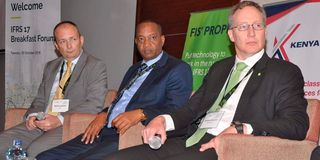How boards, top managers can steer IFRS 17 implementation

FIS Global IFRS 17 and Risk Solution Leader Mr Martin Sarjeant (L), Kenya Reinsurance Corporation MD Jadiah Mwarania (C) and Deloitte Insurance Leader Africa Mr. Andrew Warren during the IFRS17 CEO's breakfast forum at the Radisson Blue Hotel in 2018.
The inaugural year for IFRS 17 implementation is upon us now. January 1, 2023 is a date that has echoed in the insurance industry for the last few years.
One might expect that insurance companies, at least some, will open their 2023 books with IFRS 17 general ledger entries. However, the reality in our region is far from it; there is much to be done by most insurers and the East African insurance industry at large to fully meet the requirements.
Boards and senior management should carefully consider the issues discussed below to help steer their IFRS17 implementation in the right direction.
Given this is the year of implementation there is no room for inefficiencies or delays anymore. It is critical to ensure that the right activities happen, while allowing for the multiple interdependencies and critical resources that are working on your IFRS 17 project.
Individuals with IFRS 17 knowledge are limited and in high demand. We have witnessed musical chairs being played in the industry with significant movement of talent and intense head hunting. It is imperative that you manage your internal resources effectively to allow for a smoother implementation journey.
Key staff
It is also important to acknowledge that quarter one (Q1) tends to be dominated by year-end and regulatory reporting work which puts added pressure on key staff.
It is no secret that there is heavy reliance on consultants to support the implementation of IFRS 17. As a buyer of their services, you have every right to ask and ensure that your implementation partners will continue to provide you with dedicated resources.
So, if you’ve not engaged your auditor yet, the time to do so is now.
Additionally, whether internally developed or externally procured, your IFRS 17 engine needs to be in place. With the end in mind, the quicker you get to producing comparatives the faster you will understand the impact, be able to bring stakeholders along and appreciate the data and systems implications to the fullest.
Two things remain critical: one, ensure the tool you procure is fit for purpose for your business and two, that the tool provider is accessible!
Your actuarial models will need to be updated to meet the new measurement requirements. In particular, the outputs from these models will form inputs to the IFRS 17 engine.
Manipulating data
Anyone deep into the IFRS 17 implementation will unanimously agree that data and systems are the pain and backbone of getting the implementation right. Most, if not all, insurance companies have spent significant hours extracting, validating, and manipulating data to get it IFRS 17-ready.
Given that this is our new way of reporting, systems upgrades, streamlining data processes and automation needs to be prioritised to allow for timely reporting in a business-as-usual context.
A fundamental aspect of this preparation is how you communicate the impact of this transition to external stakeholders— investors and users of financial statements — with clarity and transparency.
IFRS 17 materially changes the entire financial statements, including both the quantitative and qualitative disclosures.
It is crucial that the disclosures are well thought out and designed as early in the year as possible.
Also remember that your year end 2022 financial statements will need to include IFRS 17 related disclosures to provide a narrative explaining the impact of the new standard.
It is important to remember that a project of this magnitude can readily demand more monetary resources. The way to rein this in as much as possible is ensuring it is spearheaded by the right individual(s) and having effective oversight and governance over the project.
Shah (Associate Director) and Judy Manshau (senior manager) are from PwC’s Kenya Actuarial team




